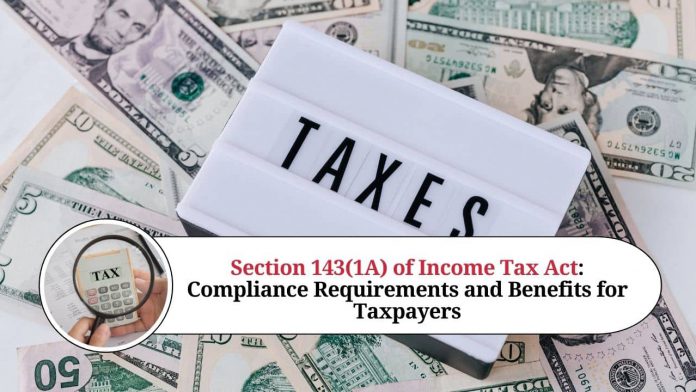Section 143(1A) of the Income Tax Act, 1961 is an important provision that was introduced by the Finance Act, 2016. This provision requires taxpayers to disclose certain additional information in their income tax returns (ITR) if they have claimed a refund of Rs. 10,000 or more in a financial year.
The main objective of this provision is to verify the genuineness of the refund claims made by taxpayers and to curb the menace of fraudulent refund claims. Let’s delve deeper into the details of Section 143(1A) and understand its implications for taxpayers.
What is Section 143(1A)?
As per Section 143(1A) of the Income Tax Act, taxpayers who have claimed a refund of Rs. 10,000 or more in a financial year need to provide additional information in their income tax returns. This information includes:
- Details of the taxpayer’s bank account such as account number, IFSC code, and the name of the bank.
- Whether the taxpayer’s bank account is a savings account or a current account.
- The mobile number and email address of the taxpayer.
- If the taxpayer has received any income from a source outside India, then the details of such income need to be disclosed.
- If the taxpayer is claiming a refund of tax paid on behalf of someone else, then the name and PAN of such person need to be provided.
- If the taxpayer is claiming a refund of tax deducted at source (TDS), then the details of the deductor such as name, PAN, TAN, and the amount of TDS deducted need to be disclosed.
- If the taxpayer has made any cash deposits of Rs. 2 lakhs or more after demonetization (i.e., after 8 November 2016), then the details of such deposits need to be provided.
Why was Section 143(1A) introduced?
Section 143(1A) was introduced by the government to address the issue of fake refund claims made by taxpayers. In recent years, there have been many instances where taxpayers have claimed refunds of large amounts by providing false information. Such fake refund claims not only cause a loss to the government exchequer but also create unnecessary hassles for genuine taxpayers who face delays in receiving their refunds.
By mandating taxpayers to provide additional information in their income tax returns, the government can verify the genuineness of the refund claims and weed out any fake claims. This will help in reducing the incidence of tax frauds and improve tax compliance.
What are the implications for taxpayers?
Taxpayers who have claimed a refund of Rs. 10,000 or more in a financial year need to ensure that they provide all the required information in their income tax returns. Failure to provide this information can result in the rejection of the refund claim.
Taxpayers also need to ensure that the information provided is accurate and genuine. Any false information provided can attract penalties under the Income Tax Act.
Who is required to comply with Section 143(1A)?
Section 143(1A) is applicable to all taxpayers who have claimed a refund of Rs. 10,000 or more in a financial year. This includes individuals, Hindu Undivided Families (HUFs), firms, companies, and other entities.
What is the timeline for complying with Section 143(1A)?
Taxpayers who are required to comply with Section 143(1A) need to provide the additional information at the time of filing their income tax returns. The information needs to be provided before the expiry of the time limit for filing the return, which is usually 31 July of the assessment year.
What happens if a taxpayer fails to comply with Section 143(1A)?
If a taxpayer fails to comply with the requirements of Section 143(1A), then the refund claim may be rejected by the Income Tax Department. In such cases, the taxpayer may have to file a revised return or make an application for rectification of the original return.
Moreover, non-compliance with Section 143(1A) can also attract penalties under Section 271F of the Income Tax Act. The penalty can be levied up to Rs. 5,000 if the taxpayer fails to file the return within the due date or up to Rs. 10,000 if the return is not filed by the end of the assessment year.
How does Section 143(1A) benefit taxpayers?
Section 143(1A) aims to ensure that genuine taxpayers receive their refunds in a timely manner. By mandating taxpayers to provide additional information in their income tax returns, the government can verify the genuineness of the refund claims and process them faster.
Moreover, Section 143(1A) can also help taxpayers in the long run as it promotes transparency and compliance. By providing accurate and genuine information in their income tax returns, taxpayers can avoid any penalties and also contribute towards building a better tax system in the country.
Conclusion
Section 143(1A) is an important provision that requires taxpayers to provide additional information in their income tax returns if they have claimed a refund of Rs. 10,000 or more in a financial year. Taxpayers need to ensure that they comply with the requirements of this provision and provide accurate and genuine information in their returns. By doing so, they can avoid any penalties and also contribute towards building a more transparent and efficient tax system in the country.
Frequently Asked Questions (FAQs)
Q.1 What is Section 143(1A) of the Income Tax Act?
A. Section 143(1A) of the Income Tax Act requires taxpayers to provide additional information in their income tax returns if they have claimed a refund of Rs. 10,000 or more in a financial year.
Q.2 Who is required to comply with Section 143(1A)?
A. Section 143(1A) is applicable to all taxpayers who have claimed a refund of Rs. 10,000 or more in a financial year. This includes individuals, Hindu Undivided Families (HUFs), firms, companies, and other entities.
Q.3 What is the deadline for complying with Section 143(1A)?
A. Taxpayers who are required to comply with Section 143(1A) need to provide the additional information at the time of filing their income tax returns. The information needs to be provided before the expiry of the time limit for filing the return, which is usually 31 July of the assessment year.
Q.4 What happens if a taxpayer fails to comply with Section 143(1A)?
A. If a taxpayer fails to comply with the requirements of Section 143(1A), then the refund claim may be rejected by the Income Tax Department. In such cases, the taxpayer may have to file a revised return or make an application for rectification of the original return. Non-compliance with Section 143(1A) can also attract penalties under Section 271F of the Income Tax Act.
Q.5 How does Section 143(1A) benefit taxpayers?
A. Section 143(1A) aims to ensure that genuine taxpayers receive their refunds in a timely manner. By mandating taxpayers to provide additional information in their income tax returns, the government can verify the genuineness of the refund claims and process them faster. Moreover, Section 143(1A) can also help taxpayers in the long run as it promotes transparency and compliance.
Q.6 What kind of additional information is required under Section 143(1A)?
A. The additional information required under Section 143(1A) includes details of the taxpayer’s bank account, including the account number, the IFSC code of the bank branch, and the type of account. Additionally, taxpayers may also need to provide other details, such as the address of the bank branch and the mobile number linked to the bank account.
Q.7 Is there any exemption from complying with Section 143(1A)?
A. There is no exemption from complying with the requirements of Section 143(1A). All taxpayers who have claimed a refund of Rs. 10,000 or more in a financial year need to provide the additional information as per the provision.




















